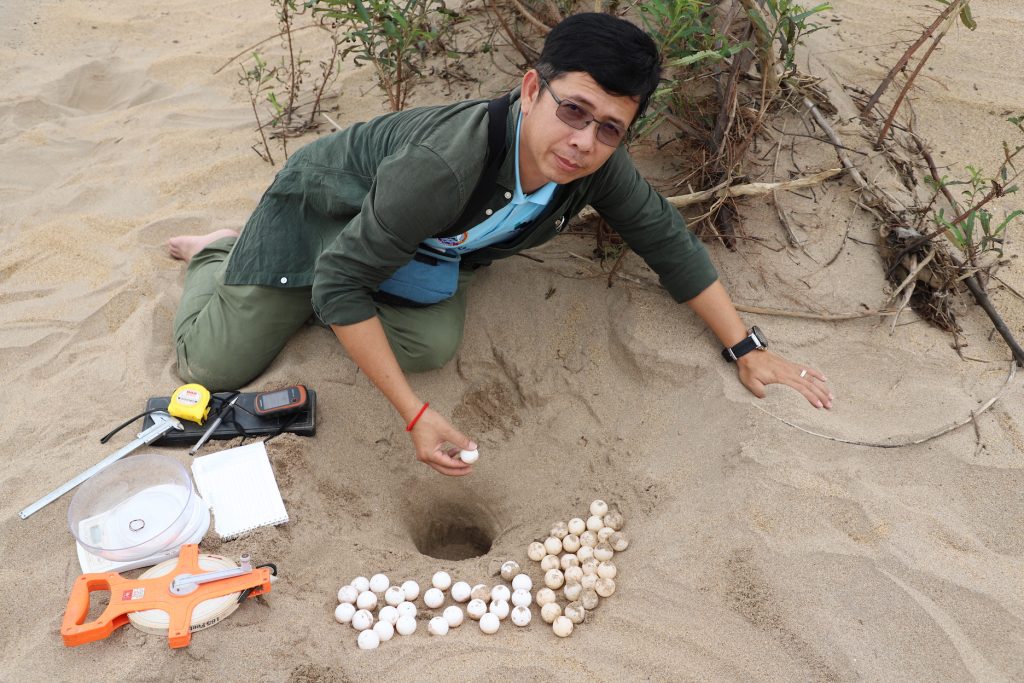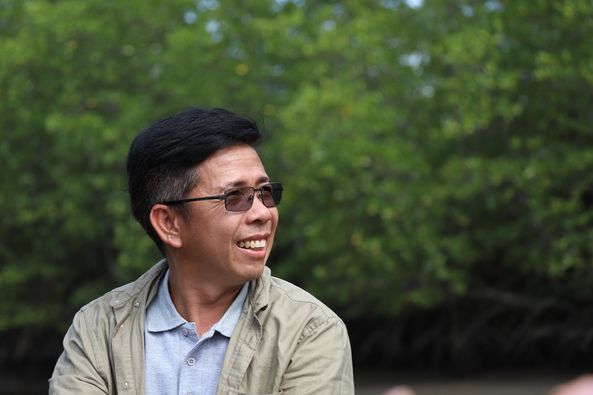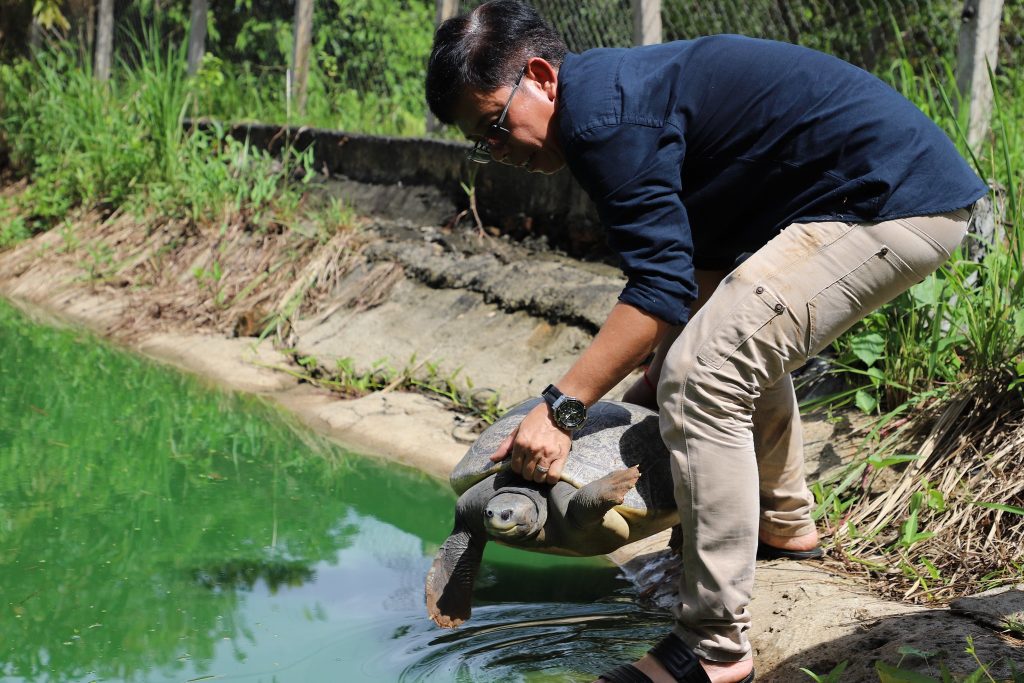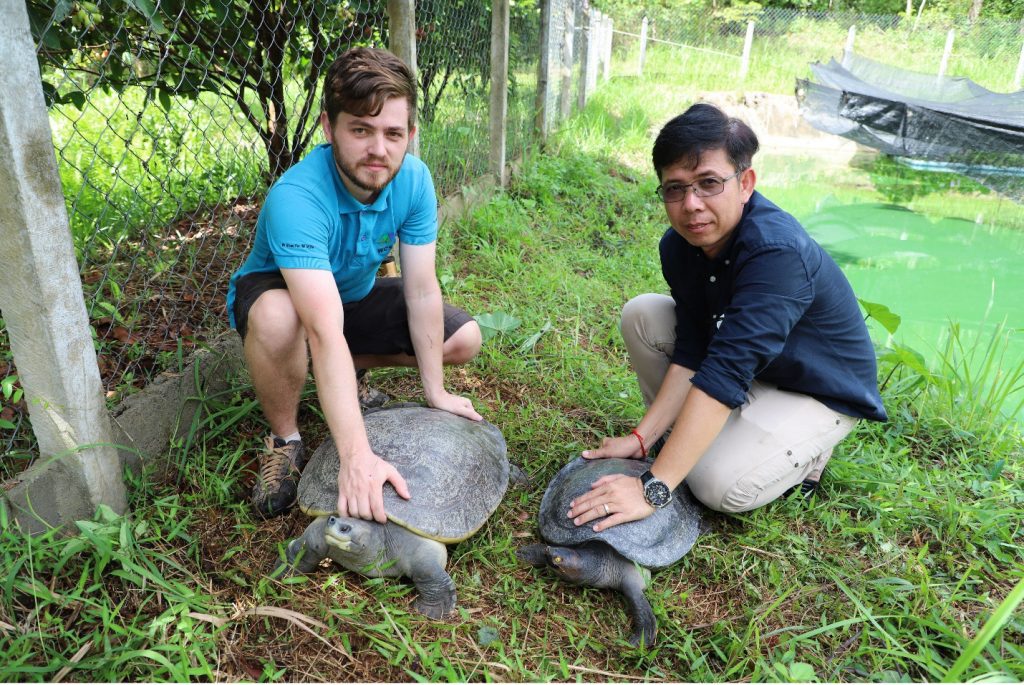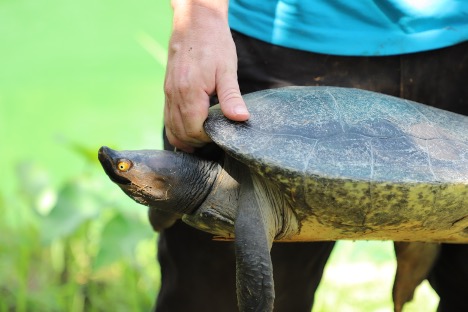Menu
Menu
បុគ្គលឆ្នើមក្នុងការងារអភិរក្សទន្លេមេគង្គ៖ សោម ស៊ីថា
ចេញផ្សាយផ្សាយ៖ ២៧ កក្កដា ២០២២
#មាតិកាប្រព័ន្ធបណ្ដាញសង្គម
We’d like to introduce you to Som Sitha, who is part of our current class of Mekong Conservation Heroes! Som Sitha is the Mekong and Sre Ambel Project Manager at the Wildlife Conservation Society
(*English below*)
កើតក្នុងគ្រួសារដែលមានឪពុកម្តាយជាកសិករនៅស្រុកព្រៃកប្បាសខេត្តតាកែវ ខ្ញុំបានចំណាយវ័យកុមារដែលព័ទ្ធជុំជិតដោយវាលស្រែ និងធម្មជាតិ។ វាអនុញ្ញាតឲ្យខ្ញុំបានរៀនស្វែងយល់អំពី ប្រភេទសត្វព្រៃ ជាពិសេសគឺសត្វស្លាប និងសត្វល្មូន។ កាលពីខ្ញុំនៅក្មេង បងប្រុសរបស់ខ្ញុំ តែងតែចាប់សត្វកន្ធាយ ច្រើនប្រភេទធ្វើជាអាហារសម្រាប់គ្រួសារយើងបរិភោគ។ ខ្ញុំបានលេង ជាមួយសត្វកន្ធាយនៅផ្ទះ ហើយក៏ កើតចិត្តស្រលាញ់ពួកវា។ អណ្តើកនិងកន្ធាយទឹកសាប គឺជា សត្វគួរឲ្យចាប់អារម្មណ៍ និងគួរឲ្យស្រឡាញ់ណាស់។ ពួកវាជាសត្វដែលស្លូតបូតបំផុត ហើយពួកវា មានភាពស្រស់ស្អាតប្លែកជាមួយនឹងពណ៌ និងស្នូកផ្សេងៗគ្នា។ បច្ចុប្បន្ននេះ ខ្ញុំមានអារម្មណ៍ថា ខ្ញុំមានឱកាសច្រើនក្នុងការចូលរួមចំណែក ក្នុងការអភិរក្សប្រភេទសត្វកន្ធាយនៅប្រទេសកម្ពុជា។
ដោយសារខ្ញុំមានចិត្តស្រលាញ់ធម្មជាតិ និងការងារអភិរក្ស ខ្ញុំបានជ្រើសរើសយកការសិក្សាផ្នែក វិទ្យាសាស្ត្របរិស្ថានសម្រាប់ថ្នាក់បរិញ្ញាបត្ររបស់ខ្ញុំនៅសាកលវិទ្យាល័យភូមិន្ទភ្នំពេញក្នុងឆ្នាំ 2000។ ក្នុងឆ្នាំសិក្សាចុងក្រោយរបស់ខ្ញុំ ខ្ញុំបានធ្វើការស្រាវជ្រាវអំពីសត្វអណ្តើក និងកន្ធាយនៅ តំបន់ជួរភ្នំក្រវាញ នាភាគនិរតីនៃប្រទេសកម្ពុជា។ ក្នុងសម័យនោះគេមិនសូវដឹងអំពីពត៌មាន របស់អណ្តើកក្នុងប្រទេសកម្ពុជាទេ។ ក្នុងអំឡុងពេលនៃការស្រាវជ្រាវរបស់ខ្ញុំ ខ្ញុំបានមើលឃើញពី ភាពស្រស់ស្អាតអស្ចារ្យ និងសារៈសំខាន់នៃព្រៃឈើ និងសត្វព្រៃ។ ជាមួយគ្នានេះ ខ្ញុំក៏បានឃើញការគំរាមកំហែងជាច្រើនលើព្រៃឈើនិងសត្វអណ្តើក ដែលយើងទាំងអស់គ្នាគួរអោយតម្លៃដល់ធម្មជាតិ និងចូលរួមអភិរក្សធនធានទាំងនេះសម្រាប់មនុស្សជំនាន់ក្រោយ។ បន្ទាប់ពីខ្ញុំបានបញ្ចប់ ការសិក្សាខ្ញុំបានធ្វើការជាមួយ អង្គការអភិរក្សអន្តរជាតិ(CI) ដើម្បីបន្តការស្រាវជ្រាវរបស់ខ្ញុំលើ សត្វអណ្តើកនិងកន្ធាយនៅក្នុងប្រទេសកម្ពុជា បន្ទាប់មកខ្ញុំក៏បានបន្តការសិក្សាថ្នាក់បរិញ្ញាបត្រជាន់ខ្ពស់ ផ្នែកគ្រប់គ្រងបរិស្ថាននៅសាកលវិទ្យាល័យ ម៉ាសី(Massey) ក្នុងប្រទេសណូវែលសេឡង់។ ចាប់តាំងពីត្រឡប់មកដល់ប្រទេសកម្ពុជាវិញ ខ្ញុំបានធ្វើការជាក្នុងតួនាទីប្រធានគម្រោងនៅអង្គការអភិរក្សសត្វព្រៃ (WCS)ពីឆ្នាំ ២០១៥ រហូតដល់បច្ចុប្បន្ន។
ចំណែកមួយនៃការងារបច្ចុប្បន្នរបស់ខ្ញុំគឺការងារអភិរក្សសត្វកន្ធាយក្បាលកង្កែប (Pelochelys cantorii) នៅតាមដងទន្លេមេគង្គ។ សត្វកន្ធាយនេះត្រូវបានគេគិតថាបានផុតពូជទៅហើយនៅកម្ពុជា មុនពេលវាត្រូវបានគេរកឃើញវិញតាមដងទន្លេមេគង្គក្នុងឆ្នាំ ២០០៧ ក្រោមការដឹកនាំរបស់រូបខ្ញុំ។ សត្វកន្ធាយក្បាលកង្កែប ត្រូវបានចាត់ថ្នាក់ជាប្រភេទសត្វជិតផុតពូជក្នុងបញ្ជីក្រហម IUCN ។ នៅក្នុងប្រទេសកម្ពុជា អនុក្រឹត្យលេខ ១២៣ ចុះថ្ងៃទី១២ ខែសីហា ឆ្នាំ ២០០៩ ក៏បានចាត់ថ្នាក់ កន្ធាយនេះជាប្រភេទសត្វជិតផុតពូជ ហើយរាល់ការចាប់ លក់ ទិញ ហូប ដឹកជញ្ជូន និងចិញ្ចឹម ប្រភេទនេះត្រូវបានហាមឃាត់ទាំងស្រុង។ សត្វកន្ធាយក្បាលកង្កែប មានសារៈ សំខាន់ណាស់សម្រាប់ប្រព័ន្ធអេកូឡូស៊ីទន្លេមេគង្គ ព្រោះវាដើរតួយ៉ាងសំខាន់ក្នុងខ្សែសង្វាក់អាហារនៃទន្លេមេគង្គ ដែលនោះក៏បាន ជួយទ្រទ្រង់ជីវភាពរបស់ប្រជានេសាទយើងដែរ។ វាក៏ជាកិត្តិយសសម្រាប់ជាតិផងដែរ ព្រោះថា កម្ពុជាត្រូវបានទទួលស្គាល់ថាជាប្រទេសមួយ ដែលអាច ការពារសត្វប្រភេទនេះ ដែលស្ទើរតែ ផុតពូជទៅហើយនៅក្នុងប្រទេសជាច្រើនក្នុងទ្វីបអាស៊ី។
ចំណង់ចំណូលចិត្តរបស់ខ្ញុំគឺការសិក្សាស្រាវជ្រាវទាក់ទងនឹងសត្វព្រៃ និងជីវៈចម្រុះ ដែលអនុញ្ញាតឲ្យខ្ញុំធ្វើការ ប្រាស្រ័យទាក់ទងដោយផ្ទាល់ជាមួយធម្មជាតិ។ ការធ្វើការជាមួយសហគមន៍ក៏ជាចំណែកមួយដែលខ្ញុំចូលចិត្ត និងយល់ដឹងទាក់ទងនឹងការលំបាកដែលប្រជាជនក្នុងមូលដ្ឋានជួបប្រទះ។ យើងត្រូវជួយអប់រំ និងលើកទឹកចិត្តពួកគាត់ឲ្យចូលរួមក្នុងការងារអភិរក្ស ដោយសារពួកគាត់ជាម្ចាស់ទឹកដី និងមានតួនាទីសំខាន់ក្នុងការងារការពារ និងលើកស្ទួយជីវភាពរបស់ពួកគាត់។ ខ្ញុំមានបំណងចែករំលែកបទពិសោធន៍របស់ខ្ញុំអោយបានទូលំទូលាយដល់ប្រជាជនគ្រប់មជ្ឈដ្ឋានអំពីតម្លៃ នៃការអភិរក្ស សត្វកន្ធាយក្បាលកង្កែប ដែលជាសត្វតំណាងដ៏សំខាន់នៅក្នុងប្រព័ន្ធអេកូឡូស៊ីទន្លេមេគង្គ ដែលយើង ត្រូវការពារកុំឲ្យបាត់បង់ ដើម្បីលើកតម្កើងមុខមាត់ប្រទេសជាតិរបស់យើង។ ខ្ញុំសូម ស្នើសុំយ៉ាងទទូច ឲ្យប្រជាជនបញ្ឈប់ការរចាប់ ជួញដូរ និងបរិភោគ សត្វកន្ធាយក្បាលកង្កែប ពីព្រោះវាជំរុញឲ្យមានការ ជួញដូរខុសច្បាប់ដែលអាចធ្វើឲ្យប្រភេទសត្វនេះអាចផុតពូជនាពេលអនាគត។ នៅក្នុងប្រទេសកម្ពុជា ការងារអភិរក្សត្រូវបានប្រជាជនភាគច្រើនមិនសូវឲ្យតម្លៃ ហើយនឹងមិនសូវត្រូវបានគេយកចិត្តទុកដាក់នោះទេ។ ការណ៍នេះជាមូលហេតុធ្វើឱ្យខ្ញុំខិតខំលើកកម្ពស់សារៈសំខាន់នៃការអភិរក្សសត្វព្រៃ។ ខ្ញុំនឹងបន្តការងារអភិរក្សបច្ចុប្បន្នរបស់ខ្ញុំដើម្បីធ្វើជាគំរូល្អដល់អ្នកដទៃទៀត ជាពិសេសយុវជនជំនាន់ក្រោយឲ្យស្រឡាញ់ និងការពារសត្វព្រៃ និងធនធានធម្មជាតិ។
Born to farmer parents in Prey Kabas District, Takeo Province, I spent my early life surrounded by rice fields and nature. This allowed me to learn about wildlife species, especially birds and reptiles. When I was young, my older brother always caught different turtle species for our family to eat. I spent time playing with turtles at home and came to love them. Freshwater turtles and tortoises are very interesting and lovely creatures. They are the gentlest animals, and they have a unique beauty with different colors and shells. Today, I feel that I have great opportunities to contribute to turtle species conservation in Cambodia.
Since I love nature and conservation work, I chose to study Environmental Science for my bachelor’s degree at the Royal University of Phnom Penh in 2000. In my senior year, I did research on tortoises and turtles in the Cardamom Mountain Range of southwestern Cambodia. Little was known about turtles in Cambodia during that time. During my research, I experienced the amazing beauty and the importance of forests and wildlife. At the same time, I also saw many threats to forests, turtles, and tortoises. This helped me see that all of us should value nature and actively conserve these resources for the next generation. After I graduated, I worked with Conservation International to continue my research on tortoises and turtles in Cambodia, then pursued my master’s degree in Environmental Management at Massey University in New Zealand. Since returning Cambodia, I have worked as a Landscape Project Manager at the Wildlife Conservation Society from 2015 until now.
Part of my current job is to conserve the Cantor’s Giant Softshell Turtle (Pelochelys cantorii) along the Mekong River. This turtle was thought to be extinct in Cambodia before it was rediscovered along the Mekong River in 2007 under my research supervision. The Cantor’s Giant Softshell Turtle is classified as a Critically Endangered species by the IUCN Red List. In Cambodia, Sub-Decree number 123 of August 12th, 2009, also classified this turtle as an endangered species, and all forms of capturing, selling, buying, consuming, transporting, or raising are prohibited. The Cantor’s Giant Softshell Turtle is crucial for the Mekong River ecological system because it plays a very important role in the food chain of the Mekong River, which is very important to local community livelihoods. It is also an honor to the nation, as Cambodia is recognized as the only country that actively protects this species which has almost become extinct in many countries in Asia.
The part of my work that I like most is conducting research studies, which allows me to interact directly with nature. Another part of my job is working with communities, and this has taught me the challenges that local people face. We have to help educate and encourage them to participate in conservation work. I wish to share my experience widely with people of all backgrounds and communicate the value of conserving the Cantor’s giant softshell turtle, which is an important iconic species in the Mekong River ecosystem that we need to protect from disappearing in order to uplift our nation’s image. I urge people to stop harvesting, trading, and eating Cantor’s Giant Softshell Turtle because this fuels the illegal trade that could make the species go extinct in the future. In Cambodia, conservation work is not much appreciated by most people and not very often taken into consideration. This is why I work hard to promote the importance of wildlife conservation. I will continue my current conservation work to set a good example for other people, especially the younger generations, to love and protect wildlife and natural resources.
Please share this post to help others learn about Sitha’s important conservation work! Follow Wonders of the Mekong to learn more about Cambodia’s Mekong Conservation Heroes. See Sitha’s full Mekong Conservation Hero profile here: https://www.mekongfishnetwork.org/mekong…/som-sitha/
